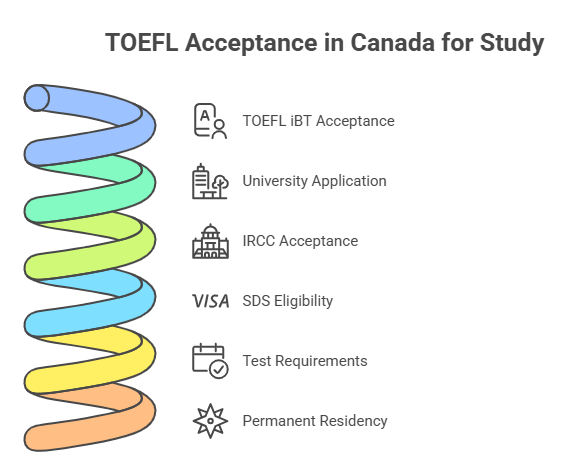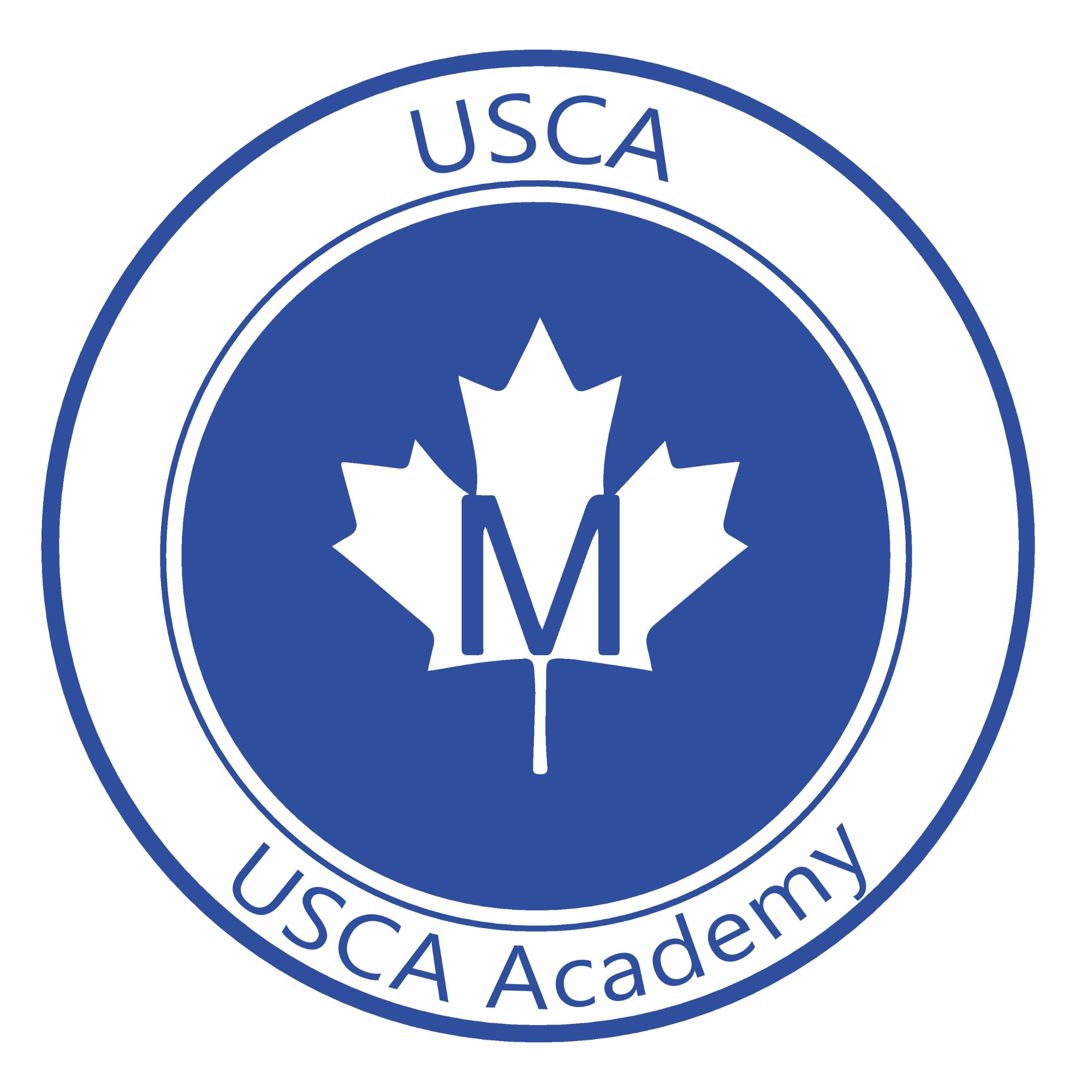Key Highlights : Is TOEFL Accepted in Canada 2026?
- Yes, the TOEFL iBT test is accepted by more than 95% of Canadian universities for 2026 admissions.
- Immigration, Refugees and Citizenship Canada (IRCC) lets people use the TOEFL iBT for the Student Direct Stream (SDS) student visa.
- Most undergraduate programs need a minimum TOEFL score between 80 and 90. But top universities and graduate programs often want a score of 100 or higher.
- You can take the TOEFL iBT at a test center or at home, and both count for language requirements.
- While the TOEFL iBT helps for a student visa, Canada does not accept it for permanent residency applications.
Introduction
Are you an international student who wants to study in Canada? If yes, you will need to show your English language skills. The Test of English as a Foreign Language, also known as the TOEFL exam, is accepted around the world. It can help you start your journey to Canadian universities.
But is this test the one you should pick? This guide will show you what you need to know about the question, “Is TOEFL Accepted in Canada?” when applying to Canadian universities. You will also find out how it helps when you apply for a student visa in 2025. This way, you will know what to expect, and you can make the right choice about your English language test.
Is TOEFL Accepted in Canada? [Official 2026 Answer]
Yes, the TOEFL iBT is widely accepted in Canada if you want to study. Most Canadian universities and colleges will take your TOEFL iBT scores as proof of English language skills. This makes it a good choice if you need to show English language proficiency for your application.
Immigration, Refugees and Citizenship Canada (IRCC) also said something important. Now, from August 10, 2023, they will accept TOEFL iBT scores for the Student Direct Stream (SDS) program. This new rule helps make it easier for international students to get a study permit. Source: “TOEFL iBT test now accepted for Canada’s Student Direct Stream (SDS) program”
Yes – 95% of Canadian Universities Accept TOEFL
You can feel confident applying to Canadian universities with your TOEFL iBT scores. According to official ETS data, nearly all Canadian universities, including top ones like the University of Toronto and the University of British Columbia, accept the TOEFL test. Many schools even prefer TOEFL over other language exams, making it a reliable choice for applicants. This means you can prepare for just one English test and use your score to apply to a wide range of programs whether you’re seeking a diploma, undergraduate, or graduate degree. Remember, your high school grades are also important for your application. Completing necessary credits at schools like USCA Academy can further strengthen your university application and improve your chances of admission.
Government of Canada Study Permit Requirements
Beyond university admission, you must meet language requirements for your Canada student visa. The IRCC now accepts TOEFL iBT scores for study permit applications, including the Student Direct Stream (SDS). For SDS, your TOEFL score should match at least CLB 7. The IRCC doesn’t set a specific minimum TOEFL score, but strong English proficiency is essential to aim for the score your university requires.
Here are some key points for your application:
- You can use the TOEFL iBT taken at a test center or Home Edition.
- Results must be from a single test session.
- Test date must be within two years.
- For permanent residency, IELTS General Training and CELPIP are required; TOEFL is not accepted.

Top Canadian Universities Accepting TOEFL Scores
| University | Minimum TOEFL Score | Notable Programs |
|---|---|---|
| University of Toronto | 100 (iBT) | Engineering, Business |
| McGill University | 90 (iBT) | Arts, Sciences |
| University of British Columbia | 90 (iBT) | Computer Science, Environmental Studies |
| McMaster University | 86 (iBT) | Health Sciences, Engineering |
| University of Alberta | 88 (iBT) | Education, Business |
| University of Calgary | 90 (iBT) | Arts, Engineering |
| University of Ottawa | 86 (iBT) | Social Sciences, Health |
TOEFL Score Requirements for Canada
The minimum TOEFL score required for Canadian universities varies by institution, as there is no universal score that applies to all. Generally, schools specify a minimum total score and may also set requirements for individual sections such as Reading, Writing, Listening, and Speaking. Achieving a higher TOEFL score can significantly enhance your application, demonstrating not only that you meet basic requirements but also that you are well-prepared for academic success in an English-speaking environment. This improves your chances of being viewed favorably by admissions teams. Next, let’s explore the differences in minimum TOEFL scores for undergraduate and graduate programs in Canada.
Minimum Scores: Undergraduate vs Graduate Programs
When considering the TOEFL score requirement for Canada, it’s important to know that undergraduate and graduate programs have different standards. Most undergraduate programs require a minimum TOEFL iBT score between 80 and 90, though a few may accept scores in the high 70s, but this is rare for direct admission. Graduate programs, such as master’s or PhD degrees, typically require higher English proficiency, with minimum scores starting at 90.
Top universities or competitive fields might even ask for 100 or higher. Remember, each program can set its own TOEFL requirements, and these can also vary by department of arts may have different criteria than engineering. Always check the admissions page of your chosen program to confirm exact TOEFL score requirements for Canada.
Competitive Scores That Actually Get You Accepted
Meeting the minimum TOEFL iBT score is just the start; aiming higher boosts your acceptance chances at Canadian universities. A score of 100 or above is considered strong at top schools, showing you’re prepared for academic life in Canada—listening to lectures, joining discussions, and writing well. If your score is slightly below the top requirement, don’t worry; an impressive academic record and a clear statement of purpose can still support your application.
Here is what you should work toward with your TOEFL iBT score:
- Tier 1 Universities (e.g., U of T, McGill): 100+
- Most Other Universities: 90-100
- Colleges and Some Universities: 80-90
- Competitive Sectional Scores: Aim for 22+ in each of the four sections.
Which TOEFL Tests Are Accepted in Canada?
When applying to schools in Canada, the primary test required is the TOEFL iBT. This globally recognized test is the standard for demonstrating English proficiency for study in Canada, and nearly all Canadian institutions that require TOEFL scores accept it.
Additionally, there is the TOEFL Essentials test, which is shorter and adapts based on your performance. However, its acceptance is limited, with only a few schools recognizing it. To maximize your chances of admission and visa approval, it is advisable to take the TOEFL iBT. Next, let’s explore the specific iBT formats accepted by schools.
TOEFL iBT and Home Edition Acceptance Status
- Canadian universities and the IRCC accept both the TOEFL iBT taken at official test centers and the TOEFL iBT Home Edition, which you can take from home under online supervision. Both versions use the same questions and scoring system.
- Whether you choose the Home Edition or the center-based TOEFL iBT, your scores are treated equally for university admission, study permit applications, and special streams like the Student Direct Stream.
- TOEFL iBT scores are valid for two years from your test date. Plan your test date carefully so your scores remain valid throughout your application process.
TOEFL vs Other English Tests in Canada
While TOEFL is a great choice, it’s not the only English language test option for Canada. The IELTS is also widely accepted, along with other tests like the Pearson Test of English (PTE Core) and the Canadian Academic English Language (CAEL) test. Choosing between these tests often depends on personal preferences, test format, and availability. It’s beneficial to compare them to find the English test that best aligns with your skills and requirements for your plans.
TOEFL vs IELTS: Acceptance Comparison
The debate about IELTS vs TOEFL for Canada concerns many students. Thankfully, both TOEFL iBT and IELTS Academic are widely accepted by Canadian universities, so you can pick whichever suits you best—schools do not prefer one test over the other. For study permits or admission, you are safe with either option.
However, for Canadian permanent residency, there is a difference. For PR paths like Express Entry, IRCC only accepts IELTS General Training or CELPIP, not TOEFL. So, if your goal is to immigrate, keep this in mind.
Here’s how both tests compare when you want to study:
- Acceptance: Both are accepted by Canadian universities.
- Format: TOEFL is computer-based; IELTS offers computer or paper.
- Speaking Test: TOEFL is on computer; IELTS is with a person.
- Visa: Both work for Canadian student visas, including SDS.
Alternative Tests (Duolingo, CAEL, PTE)
- Besides TOEFL iBT and IELTS, alternative English language tests accepted by Canadian institutions include Duolingo English Test, CAEL, and PTE Academic.
- The Duolingo English Test is popular because it is affordable and convenient, with many Canadian universities accepting it, though it is not valid for the SDS visa route.
- The CAEL test is designed specifically for Canadian post-secondary education, and all major English-speaking universities in Canada accept it. The PTE Academic is now also approved by IRCC for all study permit applications, including SDS, giving students more flexibility.
- Before choosing an alternative test, always check with your chosen university for specific requirements. Despite more options being available, TOEFL iBT and IELTS Academic remain the most widely accepted tests for Canadian study permits and university admissions.
How to Apply to Canadian Universities with TOEFL
After you take the TOEFL test and get your scores, you will need to send these as proof of English proficiency to the Canadian universities you picked, including those like USCA Academy. This step is easy, and you can do it straight from the ETS website. The official scores are there on the site.
It is very important to send your scores the right way, because this is a big part of your application. Each university in Canada may have their own steps for this. Most of the time, you must send an official score report right from the ETS website. Below, we will talk about how long your scores are good for, and how the whole sending process works.
Score Validity and Submission Process
Your TOEFL scores are valid for two years from your test date, so make sure your scores will still be valid when you apply and when your classes begin. To avoid issues, take the TOEFL early so your scores are ready before application deadlines. When you register for the TOEFL iBT, you can send your scores for free to up to four schools. If you need to send scores to more schools later, log in to your ETS account and request additional score reports for a fee.
The way to send your scores is simple:
- Log in to your TOEFL account on the ETS website.
- Choose “Send Additional Score Reports.”
- Type in the name or code of the school you want, then send your scores online. Most schools get them in a few days.
Conclusion
To sum up, knowing if the TOEFL test is accepted in Canada is important for your studies. Most Canadian universities, about 95%, take TOEFL scores. This means you can send in applications with confidence. Make sure to check the minimum score you need before you apply. Also, see how TOEFL is different from other English proficiency tests like IELTS. The process to apply may look hard, but good planning, such as seeking guidance from USCA Academy, helps you get into the program you want. If you have more questions or want help with your plans to study in Canada, reach out to us today!
Frequently Asked Questions
1. Can I apply to Canadian universities while waiting for my TOEFL results?
Most Canadian universities let you apply even if you do not have your official TOEFL scores yet. You can write your test date on the application form. When you get your scores, send them to the university right away. The scores must reach the university before their final document deadline.
2. If I take TOEFL multiple times, which score do Canadian universities see?
You get to pick the test date and scores you want to send to canadian universities. These schools only see the test scores you send from the date you choose with ETS. They do not get any other test scores. If you want, some canadian universities also take MyBest Scores. This lets them see your best scores from all the times you took the test.
3. Can I get a Canadian study permit if my TOEFL score meets university requirements but not IRCC requirements?
It is not likely. To get a Canada student visa, you have to meet the admission rules of the university. You also need to meet the language requirements set by IRCC for your student visa. If your score does not meet what they say is needed for your visa stream, such as the SDS, your study permit may not get the okay. Even if you have a letter of acceptance, you could still get a refusal.
4. Is TOEFL required for PhD programs in Canada if my research will be in English?
Yes, you usually have to show proof of English language skills. It does not matter if you did your research in English. When you want to get into graduate programs at Canadian universities, you need proof of English if your earlier school was not in English. Most PhD programs in Canada ask for a TOEFL iBT or another test like it. You have to get a high score to meet the english language proficiency needed.
5. What happens if my TOEFL score expires during my Canadian university program?
Nothing changes after you get to Canada. Your TOEFL score is needed to get in and to apply for a student visa. Once you have been accepted and you start your program, the two-year valid time for your TOEFL score does not matter anymore. There is no need to take the test again.









